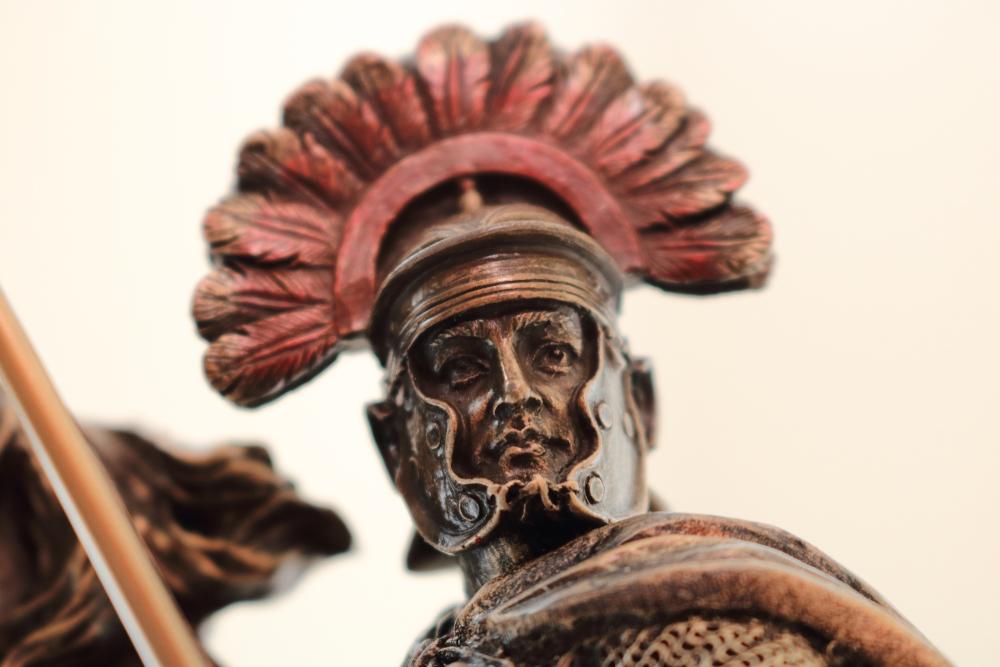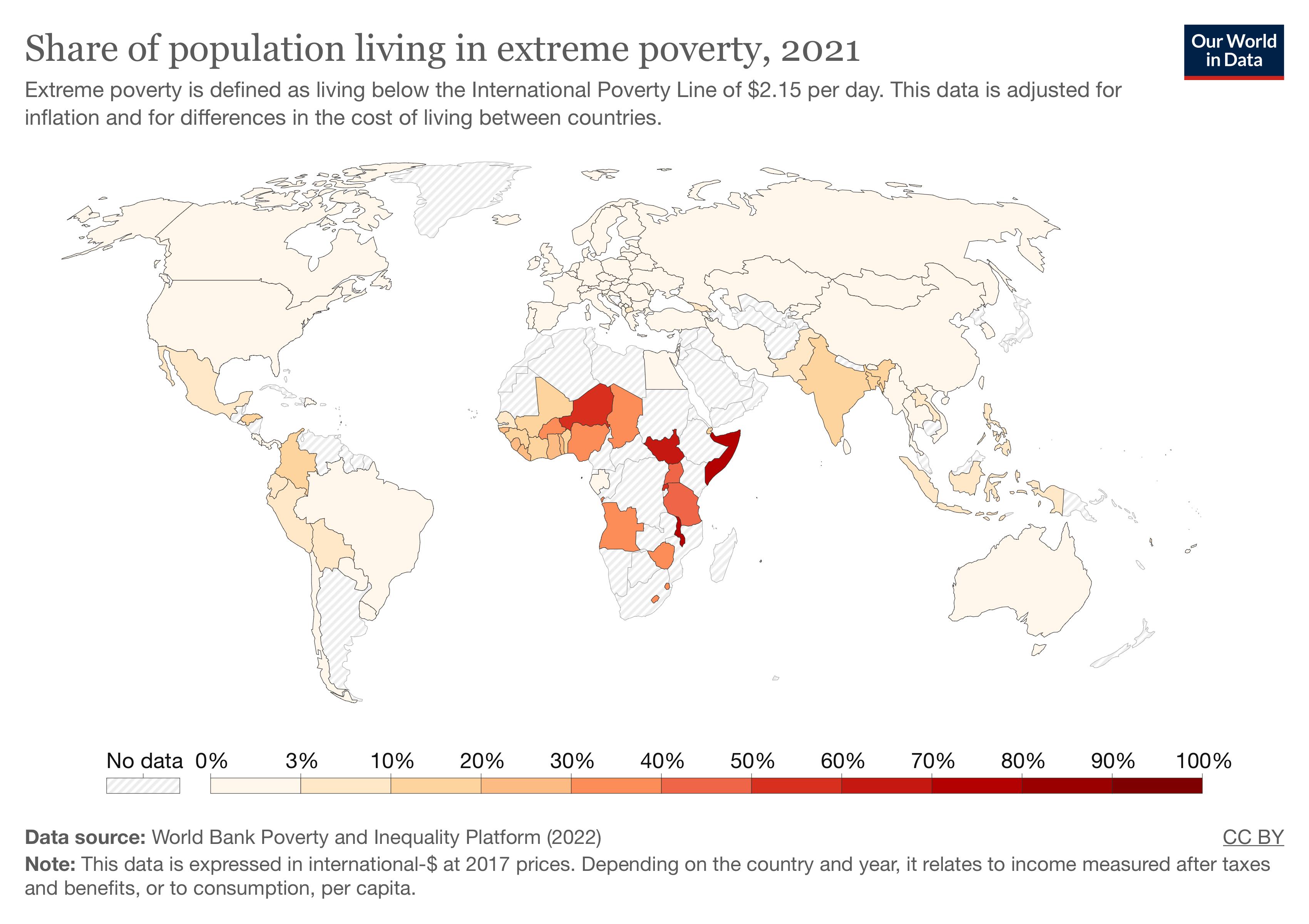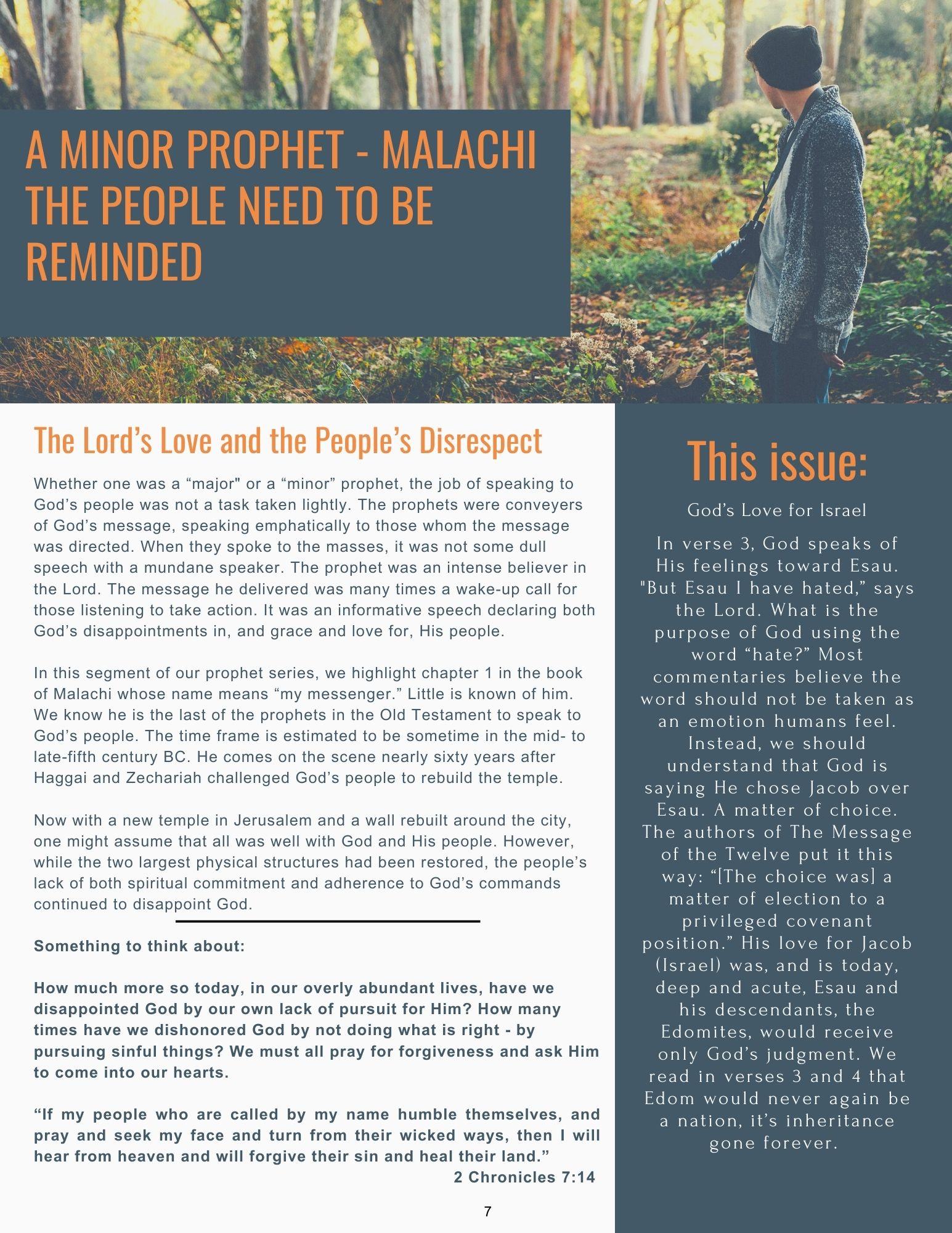
17 minute read
The Outtop Presents
The first two stanzas of Amazing Grace
Amazing grace (how sweet the sound) That saved a wretch like me! I once was lost, but now am found, Was blind, but now I see.
Twas grace that taught my heart to fear,
And grace my fears relieved; How precious did that grace appear The hour I first believed!
A very popular Christian song, Amazing Grace-published in 1779-was written by a preacher named John Newton. Source: hymnary.org/text/ amazing_grace_how_sweet_the_sound
Publisher’s Comments:
We must begin by saying that we stand with God’s people. There is no place for violence and hatred. We all want peace.
In this edition of the Bible Insights Newsletter, we continue our reading in the book of Luke - chapter 7 to be exact. As we pour through Luke 7, we see that Jesus continues to be very busy wherever He goes. Our prophet focus is on Malachi and God’s message he conveys to God’s People in chapter 1. You will also find a new section called Current Issues Impacting God’s People on page 5. We hope you enjoy this quick read and then either read the entire chapter of Luke 7 in your Bible or listen to audios of the chapter below! God Bless!
Alda
Don’t have a Bible? Here are audios of Luke 7:
Luke 7:1-10 (Jesus Heals a Centurion's Servant)
Luke 7:11-17 (Jesus Raises a Widow's Son)
Luke 7:18-35 (Messengers From John the Baptist)
Luke 7:36-50 (A Sinful Woman Forgiven)
Bible Insights Newsletter (3rd Quarter 2023)
Luke 7: Jesus Teaches and Heals
Have you ever decided to do the right thing even though your friends and/or family tell you otherwise? Perhaps everyone else was doing something you knew wasn’t right and they were urging you to do what they were doing. But you stood up to them and said “No, I’m not doing that.” We all reach many forks in the road with one choice being better than the other. In this newsletter, we read of men and women who chose to display their faith in Jesus in spite of whatever persecution they would face.
From the beginning of Luke 7, we continue to read of the healing of the sick and raising of the dead performed by Christ. There was astonishment throughout the crowds of people who witnessed such acts! Christ would then go on to acknowledge John the Baptist, the predecessor to Christ the Messiah. Matthew Henry states that he “was a man of integrity, steadiness, and faithfulness. Forgiveness for a woman who did not hesitate to show her faith in Christ is discussed at the end of the chapter.
“For to us a child is born, to us a son is given; and the government shall be upon His shoulder, and His name shall be called, Wonderful Counselor, Mighty God, Everlasting Father, Prince of Peace.”
Isaiah 9:6 (ESV)
Luke 7:1-10
The Healing of a Centurion’s Servant
You may be asking what is a centurion? During the periods of Roman dominance, the last being from 31 BC to AD476, the army consisted of centurions who were Roman officers. Each of these men commanded a group or squadron of 100 soldiers. Needless to say, Roman soldiers were despised by the Jewish people. But there was a centurion mentioned in the beginning of Luke 7, who resided in Capernaum. A Gentile, this soldier had found favor with the Jews and had newfound faith in Christ.

Healing Comes
With the centurion aware of the healing powers of Jesus, he knew Jesus was his only recourse. A servant of his whom he valued was “sick and at the point of death.” What was he going to do? The centurion had apparently exhausted all other means of assistance. Christ was the only answer.
The centurion, aware of his standing amongst Jews and wanting to show respect to Christ, decided to send “elders of the Jews.” Such men approached Jesus, imploring Him to come to the centurion’s home to heal the servant. The Jewish community respected the centurion telling Jesus that “he loves our nation, and he is the one who built us our synagogue.” Do you think Jesus went? Yes, He went with the men. Who met Jesus before getting to the centurion’s house? Friends sent by the centurion who came with a message:
“Lord, do not trouble yourself, for I am not worthy to have you come under my roof. Therefore, I did not presume to come to you. But say the word, and let my servant be healed.” Here, on one end, is the humbleness of the centurion, proclaiming that he wasn’t worthy of Jesus’ presence. And, on the other hand, is the centurion’s high views of, and faith in, Jesus. This coming from a Gentile soldier. Jesus would honor such faith by healing his servant.
Faith in Christ Alone
soldiers, he wasn’t raised in a religious home. But that should never be a deterrent to follow Christ. The apostle Paul tells us in Romans 12:2 to not do as the world does with its heathen ways - “Do not be conformed to this world.”
So what propelled him to seek the healing nature of Jesus? While the verses don’t convey an answer, it could be that the centurion had heard about the miracles that Jesus had been performing. Remember, Jesus had recently ministered to a massive congregation of people during His “Sermon on the Plain.” People from all over came to hear Him (see Bible Insights 2nd Quarter at theouttop.com). Prior to His sermon, Jesus had also healed many.
During the three years of His ministry, Jesus healed countless number of people with both physical and mental ailments. Wouldn’t you, as a Christian, do the same as the centurion - seek Jesus? In simple terms, we as Christians can relate to his faith in Christ. He was not into conforming to the world. Neither should we. While many, if not all, of his cohorts were following the lead of their superiors in worshiping other gods, the centurion chose to turn to Christ. Jesus says in verse 9 “I tell you, not even in Israel have I found such faith.”
Who will you turn to when you are in need of healing?

The
Of
-
Ephesians
Why the significance of this story of the centurion? How can we relate to this soldier? We don’t know much about him. We do know that through others - the “elders of the Jews” - he conveyed his need for Christ to heal his servant - a person who the centurion apparently loved for his hard work and faithfulness. But we don’t have background info on the centurion. It is presumed that like most Roman
Raising One From the Dead
Another busy day passes for Jesus. The next day is no different. He and His followers travel approximately 30 miles from Capernaum, which is located on the bank of the Sea of Galilee, to the town of Nain. Where is this town located? It is near the base of Mount Moreh or Moriah, the place where Abraham offered his son, Isaac, as a sacrifice to God (see Genesis 22:2) and upon which David’s son, Solomon, built “the house of the LORD” (see 2 Chronicles 3:1).
We don’t know when Jesus and His followers left Capernaum for Nain. But, unlike the modes of transportation available today in many countries, their only recourse to get from one point to another was walking. What an arduous journey this must have been. Nothing, however, was going to stop Jesus from carrying out His mission of salvation.
Did you know that the word “compassion” is used an estimated 145 times throughout the Bible? Compassion is having pity, being tender-hearted and kind, showing mercy or grace. It is having a “deep awareness of the suffering of another coupled with the wish to relieve it.” It was certainly displayed more often by Jesus than any other emotion. He felt for others. He wanted to fix the pains that others were feeling. He did. At the end of His life, He showed compassion for all of us, dying on the cross for our sins.
following the Fall in the Garden of Eden. He would defeat Satan and save people from their sins.
“I will put enmity between you and the woman, and between your offspring and her offspring; He shall bruise your head, and you shall bruise His heel.”
Faith - Where are Gen Zers Today?
Genesis 3:15
Where is your compassion?
Upon approaching the town of Nain, Jesus and His followers didn’t have to go any further than the town’s gate to witness another one’s needs and heartache. A woman whose husband was dead was now in the process of burying her only son! So tragic!
Can you imagine how Jesus must have felt at this time! He cares for each and everyone of us! The Bible tells us in verse 13 that
He had compassion on her, and said to her, “Do not weep.”
He went to the stand on which the coffin was placed. Touching the stand, Jesus said “Young man, I say to you, arise.” And, indeed, the young man dead in the coffin sat up and began speaking! He was alive once more!
In this instance, we see Jesus’ power over death. And the people who witnessed the young man being brought back to life were in awe. “God has visited His people!” they declared.
Messengers from John the Baptist
John the Baptist, at this point, is in prison. Yet, he was kept informed of happenings going on in the surrounding areas. His disciples had been keeping a close eye on the miracles and the preachings of Jesus and reported such to John.
John, in return, sent a note back with the disciples to be given to Jesus:
“Are you the one who is to come, or shall we look for another?”
For the Jews, there were high expectations of what the Messiah would be. God had first promised a Savior
John, sitting in a jail cell, needed his faith that Jesus was the Messiah, the Savior, to be confirmed. Perhaps it bothered John that the leaders of the church had not acknowledged or admitted that Jesus was indeed the Savior. Or maybe the lowliness or humble manner of Jesus’ Himself caused some doubt. The expectations of the Messiah by the people clouded their judgments of who Jesus was - that He was, in fact, the people’s Savior.
Faith in the Bible - God’s Word - and in Jesus are two areas addressed in The Barna Group study, The Open Generation. The Survey Center on American Life also provides insight into faith within the boundaries of the United States with its reportGeneration Z and the Future of Faith in America.
Both studies indicate a concern for religious faith today, especially for those who fall in the Gen Z category (those born between 1997 and 2012). There is more work to be done as just 56% of U.S. teens identified themselves as Christians in 2022.
Faith in God equates to trust in God. C. S. Lewis puts it this way in his book Mere Christianity: “To trust Him means, of course, trying to do all that He says. There would be no sense saying you trusted a person if you would not take his advice.”
From the book What Most Parents Aren’t Telling You, Christian parents rank faith in the top three “character qualities.” Whereas, the general population of parents does not have it listed in the top three qualities, which mirrors the statistic that just 39.6 percent of all parents say faith is important.
How did Jesus respond to John’s question? He did more healing - those with “diseases and plagues and evil spirits, and on many who were blind He bestowed sight.” (See Luke 7:21) He then instructed John’s disciples to go back and tell him what they saw and heard. He also mentioned in verse 23:
“And blessed is the one who is not offended by me.”
What did Jesus mean by that? Two viewpoints:
1. The humbleness of His birth, His upbringing, His poverty, and those whom He chose as His disciples might give people qualms about following Him.
2. One’s life may not turn out as he or she expected, but that person will be blessed if he or she recognizes that Jesus is the Messiah.
The importance of faith is stated in Hebrews 11:1, 3: 1Now faith is the assurance of things hoped for; the conviction of things not seen. 3By faith we understand that the universe was created by the Word of God, so that what is seen was not made out of things that are visible.
Following the departure of John’s disciples, Jesus then speaks in a commending way of John the Baptist.
“What did you go out into the wilderness to see?” Jesus asks the crowd. He then proceeds to tell them….
John the Baptist was a man of honor, uprightness, and faithfulness. He wasn’t dressed in expensive clothing nor did he eat fancy foods. John the Baptist was simple and authentic. He knew it wasn’t how he was viewed from the outside, but from the inside - where his heart was.
Jesus asks the crowd did they expect to see “a reed shaken by the wind?” A reed, yes, but John was
Verses from the Old Testament that prophesied the coming of John the Baptist:
(As you read these verses, keep in mind that John’s father, Zechariah, was a Levite. The bloodline of John was that of Levitical lineage)
Numbers 3:41 - “And you shall take the Levites for Me-I am the LORD…”
Numbers 8:7 - “Thus you shall do to them to cleanse them: sprinkle the water of purification upon them,”
Deuteronomy 18:6-7 - “And if a Levite comes from any of your towns out of all Israel, where he lives-and he may come when he desires-to the place that the LORD will choose, 7and ministers in the name of the LORD his God, like all his fellow Levites who stand to minister there before the LORD.”
Isaiah 40:3 - A voice cries: “In the wilderness prepare the way of the LORD; make straight in the desert a highway for our God.”
Malachi 3:1 - “Behold, I send my messenger, and he will prepare the way before me. And the Lord whom you seek will suddenly come to his temple; and the messenger of the covenant in whom you delight, behold, he is coming, says the LORD of hosts.”
Malachi 4:5-6 - 5“Behold, I will send you Elijah the prophet before the great and awesome day of the LORD comes. 6And he will turn the hearts of fathers to their children and the hearts of children to their fathers, lest I come and strike the land with a decree of utter destruction.”
As the forerunner for the Messiah, John preached to those who came to him that they should repent of their sins, telling the people that someone even more powerful that him was coming:

“I baptize you with water for repentance, but He who is coming after me is mightier that I, whose sandals I am not worthy to carry. He will baptize you with the Holy Spirit and fire.”
Matthew 3:11
Toward the end (in verse 28), Jesus tells the people that John was the greatest of all prophets:
“I tell you, among those born of women none is greater than John.”
A Sinful Woman Forgiven
“For all have sinned and fall short of the glory of God,”
Romans 3:23
In verse 36, we read of Jesus at the home of a Pharisee. He had been invited to eat there. Most believe there were other Pharisees present who had come as dinner guests.
This Pharisee was no exception to the other Pharisees. Proudly, they lived according to the Law and Scripture of the Old Testament. They were legalistic and were adversaries of Jesus. As a result, the Pharisee did nothing out of reverence toward Jesus, acknowledging in verse 39 that Jesus was not a prophet.
“If this man were a prophet, he would have known who and what sort of woman this is who is touching him, for Pharisee, because he was spiritually lost, was oblivious to the fact that he was in the presence of the Messiah.
Grace - this word is mentioned anywhere from 131 to 170 times throughout the Bible. Why is it so important a word? Well, it’s an important gift from God. A gift that we don’t deserve. Through grace, God is showing His love for us sinful people. Yes, God loves us. Remember John 3:16: For God so loved the world that He gave His only Son, that whoever believes in Him should not perish but have eternal life.” Paul tells us in Romans 3:23 “for all have sinned and fall short of the glory of God.” We are all sinners, but God has extended grace to us “through the redemption that is in Christ Jesus.” And with this grace that God extends, we receive eternal life.
Zechariah, his father, filled with the Holy Spirit, says in Luke 1:76-77:
76“And you, child, will be called the prophet of the Most High; for you will go before the Lord to prepare His ways, 77to give knowledge of salvation to His people in the forgiveness of their sins,”
Using a parable and discussing the actions taken by the woman in acknowledging Jesus as her Savior, the Lord admonished the Pharisee for not doing to Him as she had done. We’re all sinners. The Pharisee was a sinner but did not acknowledge as such. Jesus forgave the woman of her sins. Her faith and great love for the Lord had saved her.
Current Issues Impacting God’s People Poverty - Children’s Welfare
In this new section we will be addressing current humanitarian issues throughout the world. Issues that have long-range impacts on the future of societies and policies. Issues that depend on the heartfelt giving from churches and individuals who see the need for assistance - individuals who understand the priorities of life, who follow the two most important commandments Jesus told us to obey in Matthew 22:37-39:
And He said to him, “You shall love the Lord your God with all your heart and with all your soul and with all your mind. This is the great and first commandment. And a second is like it: You shall love your neighbor as yourself.”
How do you define the word “neighbor?”
Was Jesus referring to your neighbor as that person who lives in the house next door? Well, that would be one person to add to your list to love. But He is also referring to those who live in shelters, or in yurts, or in circular houses with straw roofs, or bamboo houses in other parts of the world. We are to love our neighbor inside and outside the womb.
Poverty Terms Defined
How is a child defined as living in poverty? The key word in the definition is deprived or denied. He or she is denied a balanced diet, water and sanitation facilities, basic healthcare, housing, and a good education.
The “international extreme poverty line” (which is a household’s income) has been set by the World Bank at $2.15 per person per day. This number represents what $2.15 will buy by way of goods and services. With inflation, however, the increase from $1.90 per day to $2.15 per day has little to no impact.


The Full Picture
There are two measurement tools used to determine child poverty. According to the endchildhoodpoverty.org, these two are
- Monetary child poverty measurement: this measurement uses household income or consumption as a means of determining if the child is poor.
- Multidimensional child poverty measurement: when using this measurement, one can get a fuller or broader view of the extent of poverty faced by children. Are the children malnourished? Is their health not good? Are the living conditions meager?
Our children are our most precious commodity.
The Bible tells us:
Jesus said “So it is not the will of my Father who is in heaven that one of these little ones should perish.”
Matthew 18:14
Then children were brought to Him that He might lay His hands on them and pray. The disciples rebuked the people, but Jesus said, “Let the little children come to Me and do not hinder them, for to such belongs the kingdom of heaven.”
Matthew 19:13-14
But Jesus, knowing the reasoning of their hearts, took a child and put him by His side and said to them, “Whoever receives this child in my name receives Me, and whoever receives Me receives Him who sent Me. For he who is least among you all is the one who is great.”
Luke 9:47-48
These are but a few verses that tell us how God viewed then, as well as now, the life of a child. There is a purpose for every boy and girl conceived. Psalm 139:16 says:
Your eyes saw my unformed substance; in Your book were written, every one of them, the days that were formed for me, when as yet there was none of them.”
God has plans for each child regardless of where they live.
A couple of months ago, a friend of mine and her daughter introduced me to one of their ministries that addresses the needs of children in a Christian-run school in Uganda (see excerpt below titled Let’s Get to Know). When I visited the website of this ministry, my heart was touched by the children in need. Children who were hungry yet had little to eat, who lived with a relative as both parents were not available, whose families needed financial support. Children who are in need of an education.
Children who need to know God. Some want to be pilots, some want to be teachers, and some want to be doctors. These are no doubt aspirations of many children around the world. After reading their stories, the decision to be a sponsor was easy.
Let’s Get to Know
His Love and SONshine is a ministry that partners with Gateway Nursery and Primary School in Bwerenga, Uganda. Our ministry has partnered with this Ugandan Christian-run school for 9 years. Due to our ministry, the school has stayed open for 9 years which provides a Christ-centered education to children. Last year we changed our way of support for the school by starting to do child sponsorship. Child sponsorship has not only been able to directly impact the lives of the students but has also given a personal connection for the donor. The children have been spared from begging on the streets for food and teens from becoming child brides. https://www.hisloveandsonshine.org/gateway-blog/yourimpact-over-the-past-9-years
In the past year 37 children have been sponsored! Our child sponsorship coordinator who works with His Love and SONshine visits the school and checks in with the school children who are sponsored. We do child sponsorship through the child sponsorship organization Bright Point. https://www.hisloveandsonshine.org/
Safeguarding a Life
If we have a heart for others, as we all should, we are not to stand idly by or, as in the story of the Good Samaritan, walk by someone (in this case, a child) we know is in need, not offering help or assistance.

Jesus tells a lawyer in Luke 10:30-37 about a man who was traveling from Jerusalem to Jericho. Robbers approached the man “who stripped him and beat him and departed, leaving him half dead.” At different times after this occurrence, a priest and a Levite saw the injured man, but instead of offering assistance, they went to the other side of the road and kept walking. Some time “a Samaritan, as he journeyed, came to where he was and when he saw him, he had compassion. He went to him and bound up his wounds, pouring on oil and wine. Then he set him on his own animal and brought him to an inn and took care of him.” The Good Samaritan took care of all expenses, including lodging

Jesus told the crowd during His Sermon on the Mount that “so whatever you wish that others would do to you, do also to them, for this is the Law and the Prophets.” (See Matthew 7:12) Jesus wants us to treat others the way we want to be treated with love, respect, and kindness.

We’ve all experienced being a child. Some of you reading this may be young adults. When we’re young we have hopes and dreams. We also have the need for food, clothing, a place to lay our head at night, and, yes, an education. Maybe we look back and wish someone had been there for us. Now would be a good time to apply the Golden Rule. How prevalent these issues are, no doubt, for children around the world. It is hard, more like incomprehensible, to understand turning one’s back on the welfare of a child. That child’s life, whether inside a womb or sitting in a classroom, is significant.
In the next edition of this newsletter, we will continue our discussion on the plight of today’s children and the impact a negative economy has on them.


